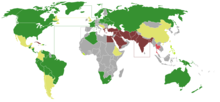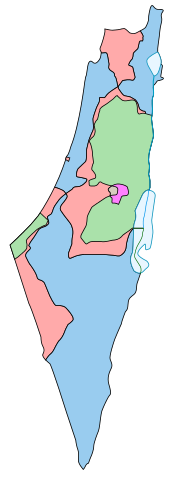联合国大会第181号决议
| 联合国大会 第181(II)号决议 | |
|---|---|
 由联合国巴勒斯坦问题特别调查委员会和巴勒斯坦问题特设委员会(UN Ad Hoc committee)提出并交由联合国大会表决的巴勒斯坦分割计划 | |
| 日期 | 1947年11月29日 |
| 会议 | 128 |
| 编号 | A/RES/181(II)(文件) |
投票 | 33票赞成 13票反对 10票弃权 |
| 结果 | 建议巴勒斯坦托管国英国及联合国所有会员国同意并实施关于巴勒斯坦未来政府的分割方案,并同意由本决议中所建议成立的经济共同体[1] |
联合国大会181号决议,即联合国巴勒斯坦托管地分割方案,于1947年11月29日在联合国大会通过[2]。该决议提出了两个临时国家的建立,一个是犹太国,另一个是阿拉伯国。该决议也建议了区域性经济共同体的框架,并提出在耶路撒冷成立耶路撒冷独立个体,委由联合国治理。
历史
[编辑]自16世纪马穆鲁克苏丹国陷落起,巴勒斯坦在内的广大中东地区便归于奥斯曼土耳其帝国的统治。奥斯曼土耳其在第一次世界大战中加入同盟国,与英法为首的协约国为敌,英国暗中支持阿拉伯人发动阿拉伯起义,其埃及远征军与土耳其爆发西奈及巴勒斯坦战役,以英军胜利告终,并于1918年签署了穆德洛斯停战协定,英国在战后接管了巴勒斯坦而成为国联巴勒斯坦托管地。
1917年至1948年间,因为种族歧视及纳粹大屠杀等原因,大量犹太人涌入曾经是犹大王国所在的巴勒斯坦地区,这使得巴勒斯坦人与犹太人的冲突开始激烈化。1947年2月18日,英国外交大臣贝文于英国国会下议院表示巴勒斯坦地位问题将会提交到联合国议决。1947年4月2日,英国正式向联合国提出将巴勒斯坦问题列入会议日程的请求[3]。
根据方案,计划于1948年8月1日,英国结束在巴勒斯坦的委任统治,英国军队全面撤走,紧接的两个月是由联合国监管的过渡时期,1948年10月1日监管时期结束,新成立的国家正式完全独立。
决议内容
[编辑]联合国大会181号决议内容:英国于1948年8月1日之前结束在巴勒斯坦的委任统治,并撤出其军队;两个月后,在总面积2.7万平方公里的巴勒斯坦的土地上建立两个国家,即阿拉伯国和犹太国。
根据分治决议的蓝图,阿拉伯国国土11203平方公里,约占当时巴勒斯坦总面积的43%,人口中阿拉伯人为72.5万人,犹太人为1万人;犹太国国土为14942平方公里,约占巴勒斯坦总面积的57%,人口中阿拉伯人为40.7万人,犹太人为49.8万人。拟议的犹太国家的大部分领土由内盖夫沙漠组成[4],在当时不适合发展农业,也不适合城市发展。决议还规定:成立耶路撒冷市耶路撒冷独立个体,由联合国治理。
分割方案的主要目标是实现两个族群间的政治分治而经济一体[5],方案尽可能纳入较多的犹太人进犹太国,这意味着把部分阿拉伯人占多数但犹太人也占显著数量的地区纳入犹太国。因此,犹太国家总体上将拥有显著数量的阿拉伯人。另外,人口稀少的地区(例如内盖夫沙漠)也被纳入犹太国家,以便为可能出现的移民提供空间。根据方案,居住在犹太国的犹太人和阿拉伯人将成为犹太国的公民,而居住在阿拉伯国的犹太人和阿拉伯人将成为阿拉伯国的公民。
| 国家 | 阿拉伯人 | 阿拉伯人占比 | 犹太人 | 犹太人占比 | 总人口 | |
|---|---|---|---|---|---|---|
| 阿拉伯国 | 725,000 | 99% | 10,000 | 1% | 735,000 | |
| 犹太国 | 407,000 | 45% | 498,000 | 55% | 905,000 | |
| 耶路撒冷国际特别政权 | 105,000 | 51% | 100,000 | 49% | 205,000 | |
| 总数 | 1,237,000 | 67% | 608,000 | 33% | 1,845,000 | |
| 另外在旱季时在犹太国内亦有约九万名贝都因人。 | ||||||
| 节录自联合国巴勒斯坦问题特别调查委员会报告第四章 1947年9月3日 | ||||||
各方反应
[编辑]犹太人
[编辑]主流犹太复国主义领导人强调建设现代犹太国家的重大责任,并致力于与该地区其他居民和平共处[6][7];但也有修正派犹太复国主义,特别是大卫·本-古里昂,认为接受该计划是一个战术步骤,也是未来在整个巴勒斯坦领土扩张的踏脚石。[8][9]
表决结果
[编辑]
表决最终在1947年11月29日举行,根据投票规则议案需要在57个联合国成员国中以三分之二的大比数通过(不计算缺席和弃权的票数)。议案以有效票33票(72%)赞成、13票反对下通过。美国与西欧国家,苏联为首的东欧共产阵营,都在表决中投下赞成票,英国作为托管国以弃权表示中立,伊斯兰国家及阿拉伯国家则反对议案。
| 赞成国(33) | 反对国(13) | 弃权国(10) | 缺席国(1) |
|---|---|---|---|
| 东欧国家: 西欧国家: 美洲国家: 亚洲国家: |
欧洲国家: 美洲国家: 非洲国家: |
东欧国家: 西欧国家: 美洲国家: 非洲国家: 亚洲国家: |
亚洲国家: |
后续
[编辑]
1949年停火线(绿线):
尽管决议获得联合国大会通过,巴勒斯坦分治方案和经济共同体的构想最终并没有实现。决议通过后巴勒斯坦托管地的犹太人和阿拉伯人之间随即爆发一系列的暴力事件,又称为1947-48年巴勒斯坦内战 [10]。1948年5月14日,英国的托管期结束,其在巴勒斯坦的最高级官员巴勒斯坦高级专员及英国军队撤出耶路撒冷和巴勒斯坦地区。英国在离开前没有采取任何措施为耶路撒冷及巴勒斯坦实现第181号决议下的国际政权和以巴分治[11],因而留下了一个权力真空。当天傍晚,犹太国民议会聚集在以色列独立厅(当时的特拉维夫艺术博物馆)通过以色列独立宣言,宣布依照联合国大会通过的本决议,建立独立的以色列国(即本决议的犹太国)[12]。一天后的5月15日,阿拉伯国家联合发起对以色列的进攻,意图消灭以色列,引发了第一次中东战争。[13]
战争于1949年结束,战后的以色列占领比联合国分割方案更多的领土,而阿拉伯人控制的加沙地区及约旦河西岸分别由埃及和约旦控治,约旦河西岸1948年在耶利哥会议后,在1950年被正式吞并入约旦,直到1967年的六日战争为止。
巴勒斯坦立国法理依据
[编辑]1988年,巴勒斯坦解放组织以联合国大会第181号决议为依据,宣布了巴勒斯坦独立宣言并随之独立,本决议仍然继续为巴勒斯坦人民享有主权和民族独立的权利提供国际的合法性[14]。 许多学者发表了支持这种观点的文章[15][16][17]。
联合国大会在2003年通过第ES-10/14(2004)决议,将包括第181号决议案的以巴冲突问题向国际法院要求提供咨询意见[18]。法官Abdul Koroma在判词中表述了多数意见:“法院认为自决权是国际法下既定和公认的权利,适用于巴勒斯坦的土地及其人民。因此,此自决权利使巴勒斯坦人民有权利按照第181号决议案和随后的多个决议案建立他们自己的国家。[19] ”
回顾
[编辑]2011年,时任巴勒斯坦总统马哈茂德·阿巴斯承认阿拉伯国家在1947年拒绝联合国的巴勒斯坦分割方案是一个错误,他希望可以加以纠正[20]。
参考文献
[编辑]- ^ A/RES/181(II) of 29 November 1947. United Nations. 1947 [8 December 2012]. (原始内容存档于2017-10-10).
- ^ 联合国大会 第-1届会议 Resolution 181. Future government of Palestine A/RES/181(II) 29 November 1947. [2008-09-01].
- ^ 殷罡:巴勒斯坦阿拉伯国法律地位的确立. 《阿以冲突:问题与出路》第8、9、10章(国际文化出版公司,2002年版). 共识网. 2014-07-14. (原始内容存档于2015-12-08).
- ^ Benny Morris. 1948: a history of the first Arab-Israeli war. Yale University Press. 2008: 47 [13 July 2013]. ISBN 978-0-300-12696-9. (原始内容存档于2023-01-19).
The Jews were to get 62 percent of Palestine (most of it desert), consisting of the Negev
- ^ United Nations Special Committee on Palestine: Report to the General Assembly: Volume 1: 51. 3 September 1947 [20 April 2017]. A/364(SUPP). (原始内容存档于2021-10-01).
The primary objectives sought in the foregoing scheme were, in short, political division and economic unity: to confer upon each group, Arab and Jew, in its own territory, the power to make its own laws, while preserving both, throughout Palestine, a single integrated economy, admittedly essential to the well-being of each, and the same territorial freedom of movement to individuals as is enjoyed today.
- ^ Palestine Jewry Joyous at News; Ben-Gurion Voices Attitude of Grateful Responsibility – Jerusalem Arabs Silent. The New York Times. 30 November 1947: 58 [9 January 2012]. (原始内容存档于2024-04-09).
- ^ Vote On Palestine Cheered by Crowd. The New York Times. 30 November 1947 [9 January 2012]. (原始内容存档于2023-10-16).
- ^ David McDowall (1990). Palestine and Israel: The Uprising and Beyond. I.B. Tauris. p. 193.. ISBN 9780755612581.
Although the Jewish Agency accepted the partition plan, it did not accept the proposed borders as final and Israel's declaration of independence avoided the mention of any boundaries. A state in part of Palestine was seen as a stage towards a larger state when opportunity allowed. Although the borders were 'bad from a military and political point of view,' Ben Gurion urged fellow Jews to accept the UN Partition Plan, pointing out that arrangements are never final, 'not with regard to the regime, not with regard to borders, and not with regard to international agreements'. The idea of partition being a temporary expedient dated back to the Peel Partition proposal of 1937. When the Zionist Congress had rejected partition on the grounds that the Jews had an inalienable right to settle anywhere in Palestine, Ben Gurion had argued in favour of acceptance, 'I see in the realisation of this plan practically the decisive stage in the beginning of full redemption and the most wonderful lever for the gradual conquest of all of Palestine.
- ^ Sean F. McMahon. The Discourse of Palestinian-Israeli Relations. Routledge. 2010: p40.
"The Zionist movement also accepted the UN partition plan of 1947 tactically. Palumbo notes that “[t]he Zionists accepted this scheme [the UN partition plan] since they hoped to use their state as a base to conquer the whole country.” Similarly, Flapan states that “[Zionist] acceptance of the resolution in no way diminished the belief of all the Zionist parties in their right to the whole of the country [Palestine]”; and that “acceptance of the UN Partition Resolution was an example of Zionist pragmatism par excellence. It was a tactical acceptance, a vital step in the right direction – a springboard for expansion when circumstances proved more judicious.”
- ^ Article "History of Palestine", Encyclopædia Britannica (2002 edition), article section written by Walid Ahmed Khalidi and Ian J. Bickerton.
- ^ Yoav Gelber, Independence Versus Nakba; Kinneret–Zmora-Bitan–Dvir Publishing, 2004, ISBN 965-517-190-6, p.104
- ^ Declaration of Establishment of State of Israel: 14 May 1948. [2020-07-01]. (原始内容存档于2012-03-21).
- ^ Cablegram from the Secretary-General of the League of Arab States to the Secretary-General of the United Nations 15 May 1948: Retrieved 4 May 2012
- ^ See Request for the admission of the State of Palestine to Unesco as a Member State (PDF). UNESCO. 12 May 1989 [2020-06-28]. (原始内容 (PDF)存档于2011-07-28).
- ^ See The Palestine Declaration To The International Criminal Court: The Statehood Issue Archived copy (PDF). [19 July 2009]. (原始内容 (PDF)存档于16 July 2011). and Silverburg, Sanford R. (2002), "Palestine and International Law: Essays on Politics and Economics", Jefferson, N.C: McFarland & Co, ISBN 0-7864-1191-0, pages 37–54
- ^ See Chapter 5 "Israel (1948–1949) and Palestine (1998–1999): Two Studies in the Creation of States", in Guy S. Goodwin-Gill, and Stefan Talmon, eds., The Reality of International Law: Essays in Honour of Ian Brownlie (Oxford: Clarendon Press, 1999)
- ^ Sourcebook on public international law, by Tim Hillier, Routledge, 1998, ISBN 1-85941-050-2, page 217; and Prof. Vera Gowlland-Debbas, "Collective Responses to the Unilateral Declarations of Independence of Southern Rhodesia and Palestine, An Application of the Legitimizing Function of the United Nations", The British Yearbook of International Law, 1990, pp.l35-l53
- ^ 以色列在被占领的东耶路撒冷和其余被占领巴勒斯坦领土的非法行动 (PDF). 12 December 2003 [2020-06-28]. (原始内容存档 (PDF)于2020-06-28).
- ^ See paragraph 5, Separate opinion of Judge Koroma 互联网档案馆的存档,存档日期4 June 2011.
- ^ Abbas should change his locks before next wave of Palestinian prisoners freed. Haaretz. 6 December 2011 [2020-06-28]. (原始内容存档于2012-06-16).
